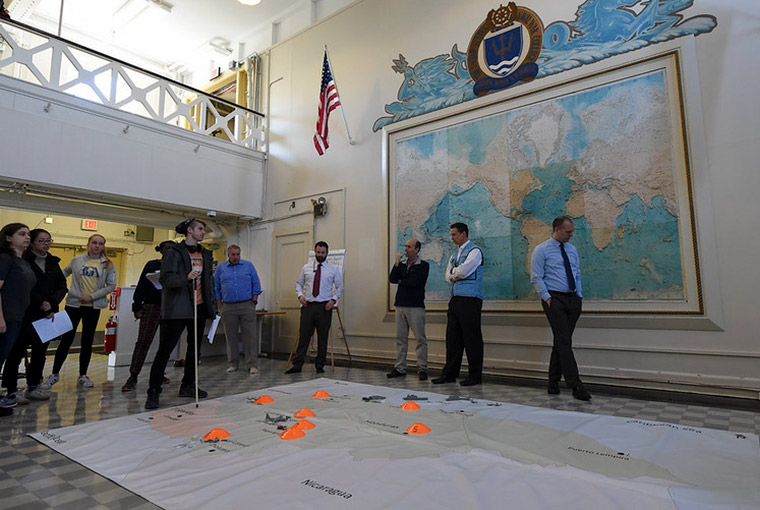Naval War College and Brown University Co-host 4th Annual Civilian-Military Humanitarian Response Workshop

NEWPORT, R.I. – The U.S. Naval War College’s Humanitarian Response Program and Brown University’s Center for Human and Humanitarian Studies co-hosted the 4th Annual Civilian-Military Humanitarian Response Workshop on Sept. 18. An international group of academicians, humanitarian practitioners and military officers took part in the workshop. Due to COVID-19 travel restrictions, the U.S. Naval War College (NWC) held this year’s event in an online webinar format with Brown University’s Center for Human Rights and Humanitarian Studies (CHRHS), which is housed in the Watson Institute for International and Public Affairs.
The workshop focused on three critical issues facing humanitarians and militaries in conflict settings: aid worker security, humanitarian access and protection of civilians. The overarching emphasis of the workshop stressed the need for the U.S. and international militaries, United Nations Office for the Coordination of Humanitarian Affairs, nongovernmental humanitarian organizations and academia to work collaboratively in developing new research ideas and professional educational opportunities to improve civil-military coordination during humanitarian crises. In addition to featuring a panel with speakers exploring challenges and opportunities in humanitarian civil-military coordination, six different working groups presented the outcomes of meetings that had taken place prior to the workshop convening.
Workshop co-host and a core professor in the NWC Humanitarian Response Program, Hank Brightman, Ph.D., NWC’s EMC Informationist endowed chair, stressed the importance of the NWC-Brown annual workshop.
“The value of engaging in meaningful discussion with stakeholders from across the landscape of humanitarian response cannot be overstated,” said Brightman. “This is particularly important in the age of COVID-19, where issues of access to vulnerable people have become a greater challenge due to health and safety concerns. Creativity and innovation must be shared across organizations if we hope to be successful in serving others in need.”
Adam Levine, Ph.D., director of Brown University’s CHRHS and workshop co-host, highlighted some of the positive outputs of this collaborative series.
“The workshop brought together over 120 participants from humanitarian organizations, United Nations (UN) agencies, domestic and foreign militaries and academic institutions to continue to explore the most pressing challenges to humanity,” said Levine. “We are grateful for the opportunity to continue to work with so many leading minds from across the humanitarian sector.”
Michael Marx, chief of guidance, plans and training for the United Nations Office for the Coordination of Humanitarian Affairs (OCHA), Civil-Military Coordination Service helped facilitate the event and stressed that this annual workshop is important to advancing coordination between diverse actors who respond to crises.
“This unique workshop continues to offer a welcome and critically needed opportunity to bring civilian and military leaders together and discuss ways we can improve humanitarian civil-military coordination to address humanitarian challenges across the globe,” said Marx. “UN-OCHA's Civil-Military Coordination Service team will continue to leverage the intellectual capacity of this group to help us seek solutions to the most pressing operational issues we face in humanitarian emergencies.”
On a panel that included speakers from the International Committee of the Red Cross and Doctors Without Borders, retired Adm. James Stavridis spoke on the panel exploring contemporary challenges to humanitarian response.
"While the United States and its international governmental counterparts, nongovernmental organizations, and private sector partners have achieved widespread success in responding to natural disasters, the challenges posed by human-caused catalysts to instability such as corruption and violence are less understood,” said Stavridis. “Workshops such as the NWC-Brown event shine a beacon on the need for further research in these areas. Only by working together towards a collective good, can we achieve unity of effort in response to such complex situations.”
Established in 1884, U.S. Naval War College is the oldest institution of its kind in the world. More than 50,000 students have graduated since its first class of nine students in 1885 and about 300 of today’s active duty admirals, generals and senior executive service leaders are alumni.
